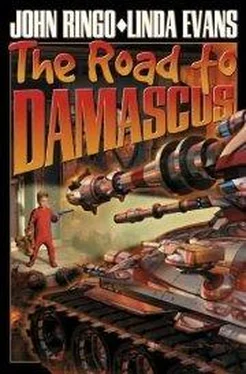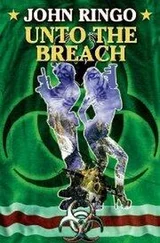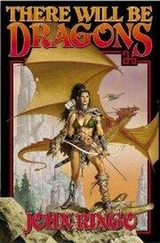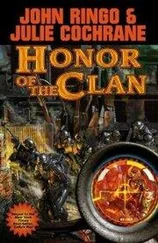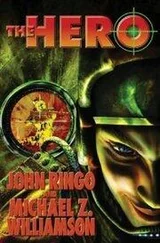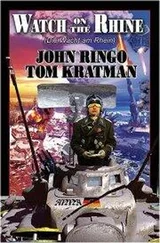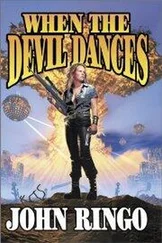Heads swivel upwards as the entire group peers toward the battle honors welded to my turret. General Hightower actually steps forward for a closer look. “That’s mighty impressive, Sonny,” the general says as rain begins to splash into the muddy ground. “Seventeen campaign medals, three rhodium stars, and good Lord, is that four galaxy-level clusters? Very impressive.”
“Thank you, General Hightower. I look forward to coordinating defense plans with you. My mission-briefing files don’t mention it, but are you the Dwight Hightower who turned back the Quern advance on Herndon III?”
The general’s eyes widen in startlement. “How the devil did you know about that?”
“My Commander during the Herndon liberation campaign was Major Alison Sanhurst. She spoke highly of you, General.”
A strange, bittersweet expression touches Dwight Hightower’s rugged, battle-scarred face. “Good God, that was nearly sixty years ago. Your commander was a fine woman, Sonny. A fine woman. We wouldn’t have held the Quern back on Herndon III without her. She died bravely. And she’s still missed, very much so.” General Hightower’s eyes have misted with water that is not from the increasingly chilly rainfall.
“Thank you, General,” I say quietly, but his words have triggered unhappy memories. Alison Sanhurst did, indeed, die bravely, evacuating children under heavy enemy fire while I was out of commission, awaiting emergency battlefield repairs. I have never forgotten her. Or forgiven myself for failing her.
President Lendan clears his throat and points toward the four-meter-long slice melted across my prow. “What in the world hit you there?”
I do not like remembering the battle in which I sustained that damage and do not wish to hurt Simon, but I have been asked a direct question from the man who will be issuing orders to my Commander and myself. It would be impolitic to refuse an answer.
“I sustained injury under concentrated fire from the plasma lances of a Yavac Heavy, which I destroyed at Etaine.”
As the politicians and even the press murmur to one another, my Commander says harshly, “ Sonny destroyed the other fourteen Yavac Heavies shooting at him, too. Even after they blew his treads and most of his gun systems to dust and turned half his armor to slag. That’s where the fourth galaxy-level cluster came from. The gold one. Every other Bolo on that battlefield died. We’re so short on Bolos, they rebuilt Sonny and sent him out here. With me.”
The pain in Simon’s voice is raw. So raw that no one speaks for eight point three seconds. President Lendan’s voice finally breaks the desperate silence, and betrays emotional stress of his own. “Sonny, Major Khrustinov, it is a genuine honor to have you here. I only hope we can acquit ourselves as bravely as you have.” His unstated hope — that Jefferson does not become a second Etaine — is clearly written in the deepened stress lines in his long, tired face. The responsibility of high office is always exhausting, and never more so than when war looms large on the horizon.
“I hope it won’t offend Sonny,” President Lendan turns to my Commander, “but you ought to come into town, Major Khrustinov. We can go over everything in my office. The bottom’s about to drop out of that storm,” he indicates the rain, which is now gusting in drifts ahead of the main squall line.
Simon merely nods as they head toward the cars. “I’ll be wearing a commlink, so Sonny can participate in the discussions, no matter where they’re held. We’ll need his input, his battle experience. And I’ll want to upload into his data banks any local information you have that might be helpful. Anything that wasn’t forwarded to us with our mission briefing.”
“General Hightower and his staff have prepared quite a bit of data for you. Very good, Major. There’s room for you in my car.”
As the group scatters, hurrying as the rain slashes across the clearing in deadly earnest, I drop into Standby Alert status. This first meeting has gone well, leaving me to hope that Jefferson may prove to be a good home for Simon.
If we can defend it from the coming storms of war.
Or a repetition of history.
As the motorcade drove through the storm-lashed streets of Jefferson’s capital city, Simon realized he was in serious danger of falling in love with his new home. It was bitterly fitting that within moments of his arrival, blowing sheets of grey rain had shredded every delicate flower in sight. Even so, the city was beautiful, full of Old Terra-style architecture that he’d seen only in photos and movies. Madison boasted real charm, with fluted columns and triangular pediments on many of its public buildings. Gardens were graced with fountains and mosaics and what must have been locally produced bronze and marble statuary, much of it in an earthy, compelling style he’d never seen, but liked a great deal.
It helped that nothing he saw resembled anything on Etaine.
Simon was — on his father’s side, at least — Russian, and therefore pragmatic, so he looked at the world steadily, seeing what was, recognizing what wasn’t, and understanding what it would take to create the things that might be, if one applied a great deal of hard work to the effort of building them. As the car pulled up to a long, covered portico where doormen waited beneath a weather-proofed awning, ready to open the doors the moment they halted, Simon was hoping rather fiercely that he got the chance to do some of that building.
Ten minutes later, Simon found himself in the president’s own briefing room, sipping a local beverage that put coffee to shame — both on taste and a welcome caffeine jolt — and prepared to conduct his first official meeting with Jefferson’s defense forces. The reporters who’d followed them back to town and through the motorcade’s winding route to the Presidential Residence were now blessedly absent, although he suspected they would stick to him like Setti-5’s bat-wing remoras until the ion bolts started flying.
There was nothing inherently detestable about reporting as a profession, if the reporters did their jobs properly; but preparing for war could be sheer hell, with irresponsible press reports flying wild from town to town or — worse — racing through interstellar space with myriad, nonhuman ears attuned to human broadcast frequencies. Major Simon Khrustinov had yet to meet a reporter he liked, let alone trusted. Of course, after the disaster at Etaine, he was perhaps a bit jaded…
“Ladies, gentlemen,” President Lendan said as a staffer closed the conference room doors with a soft click, “your attention, please.”
There was a general shuffling toward chairs. There was no formal invocation of deity — Jefferson was polyglot enough, it might’ve been long-winded, if there had been — or even an exhortation about duty to state. There was just an air of expectancy that spoke volumes, all of it deeply respectful of the man at the head of this particular table. And of one another, come to that. Simon liked more and more of what he was seeing.
Abe Lendan met Simon’s gaze and said, “Major, I won’t waste your time or ours, going over what was in your briefing materials. Just let me say that the people of Jefferson are solidly united behind this defense effort.” A brief twitch of his lips betrayed a moment’s humor. “After the last Deng war, all you have to do around these parts is say ‘spodder’ and people scramble for the nearest shelter. The invasion a century ago was memorable, to say the least.”
Simon knew exactly how memorable. With Jefferson’s military forces taking forty percent casualties and civilian death tolls approaching two million before the Concordiat relief effort broke the siege, barely a single family had escaped without the loss of at least one member. Some had been virtually wiped out. “I’ve read the files,” Simon said quietly. “Your people waged one of the finest home-defense campaigns of that war.”
Читать дальше
